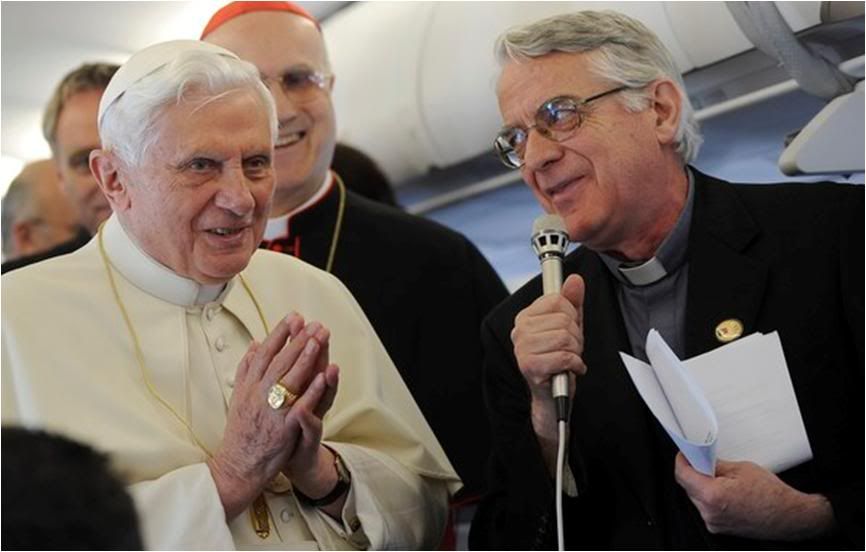PRAYERS AND BEST WISHES FOR
FR. LOMBARDI ON THE GOLDEN JUBILEE
OF HIS PRIESTLY ORDINATION

VATICAN CITY, NOV. 15, 2010 (Zenit.org).- Jesuit Father Federico Lombardi is celebrating 50 years since his religious professions. He is sharing his experience working in Vatican communications, close to Benedict XVI.
The director of the Vatican press office, the Vatican Television Center and Vatican Radio celebrated his anniversary on Friday.
In an interview given to the Vatican broadcasting station, the Jesuit priest reviewed the path that led him to choose the religious life, recalling above all an episode linked to the Sagrada Familia (Holy Family), the church in Barcelona that was dedicated by Benedict XVI on Nov. 7 during his pastoral visit to Spain.
Father Lombardi, a native of Piedmont, Italy, said he had a "lovely youth," which he recalls with "very great joy."
"My family was a very united and also very religious," he said, and "I lived in an educational environment that I remember with very much gratitude: be it the school of Jesuits, or the Oratory and the activities with youngsters of the Salesians."
The priest recalled, "Then when I reached 18 and finished secondary school, I naturally faced the problem of how to continue my life: I would say that my choice to dedicate my life to the service of the Lord and of others was quite spontaneous at that moment."
"As regards where and how to realize it," he continued, "it was natural for me to ask the Society of Jesus to enter their order, although I have always also had a very great friendship and closeness with the Salesians."
At the end of his religious and priestly formation, his superiors sent him to Rome to work in
La Civilta Cattolica, the Jesuit journal of culture.
"From then on I stayed in this field, always doing the things I was asked to do," said the Vatican spokesman.
He recalled, "After 11 years in
La Civilta Cattolica, for six years I was provincial superior of the Italian Jesuits; and then, at the end of this assignment, I was 'sent' to the Vatican, as program director of Vatican Radio and subsequently I carried out other tasks."
Among the many significant episodes of his life, Father Lombardi recalled one that came to mind thanks to Benedict XVI's latest international trip: to Santiago de Compostela and Barcelona, Spain.
"When I was 13," he said, "I made my first great trip on bicycle through Europe, with the scouts of the Salesians' Oratory, arriving in Barcelona from Turin."
The priest continued: "Arriving in Barcelona, and not knowing where to go, at a certain point, we saw four very tall spires and we said: ':et's go there.'
"It was the Nativity facade of the Sagrada Familia, which was still very behind in construction. At 13, my first point of arrival, of my first long bicycle trip together with my companions -- later I made four or five tours through Europe -- was at the Nativity facade of the Holy Family church where the Pope recited the Angelus."
"I was able to measure, 55 years later, how this building had grown and I also thought of my life, and how it has developed in the service of the Church, beginning precisely from that day," the Jesuit observed.
In regard to his mission in the communications sector of the Holy See, Father Lombardi said that he held as "absolutely fundamental" that service relating to events of the Pope and of the Church.
He noted that this service should be "the result of a community of work, of persons who want to carry out a service for the Church today in the field of communications."
The priest added, "The Pope describes himself as 'servant of the servants of God;' very well, I and all the persons who collaborate with me are 'servants of the servant of the servants of God!'"
"I am a Jesuit," he affirmed, "I am a priest and I have tried to do the things that were asked of me, because we have a vow of obedience: hence, we receive 'missions' -- we call it thus -- that is, assignments, tasks from our superiors."
As to his relationship with Benedict XVI, Father Lombardi said that "with him at times a look or a word is sufficient."
The priest continued: "He is an immensely attentive person, who listens with very keen attention, kindness and profundity what another says.
"I think that we should also pay the same attention to him, because the phrases he says to us are much more important than ours."